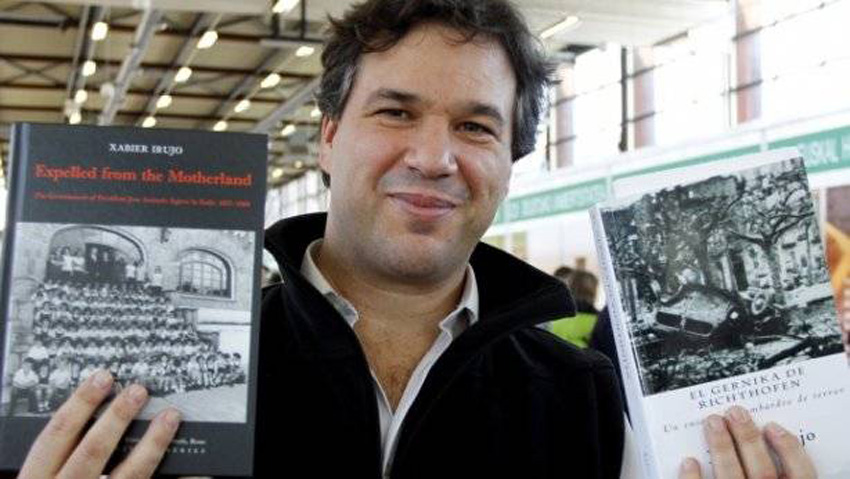Donostia-San Sebastian. The University of Liverpool and the Etxepare Basque Institute began the Manuel Irujo Fellowship Chair for the 2014-15 year, aimed at supporting the study of Basque topics. This first year is dedicated to the study of Manuel Irujo Ollo, one of the leading politicians in exile. Something that invited professor, Xabier Irujo Ametzaga, knows a lot about, historian at the Center for Basque Studies at the University of Reno and Irujo’s nephew.
We spoke to him about the development of the chair and the activities that will be take place over the coming months, beginning with the “Manuel Irujo and the 20th Century Basque Politics,” conference that will take place next Monday.
-You came to Liverpool from the CBS in Reno, as the first invited professor of the Manuel Irujo Fellowship Chair in Liverpool. How is it going?
These types of experiences are very enriching, for whoever comes as the professor, as well as for those who host him. It serves to create new projects, to face new challenges and to contrast new ideas, in the end, it is to learn.
-What is your goal for your stay? What activities have you carried out?
I think it will be a productive stay that will strengthen the ties between the CBS and the University of Liverpool. This is one of the greatest benefits, to widen the network of researchers on Basque themes in the Diaspora. In less than one month, Gorka Mercero (Basque teacher at the University of Liverpool) and I have organized a two-day seminar, six talks, and a course looking forward to the coming months. In addition, in March I will participate in other conferences at the London School of Economics and in Manchester for example.
-How has your stay been so far?
As i said, we have a full agenda of ambitious projects. We are very satisfied. The first event of my stay was the annual talk, the “Manuel Irujo Annual Lecture,” on February 10th. I talked about the bombing of Gernika, and the talk lasted for two hours with the presentation and discussion following. There were nearly 50 people present including people who came from London.
-You have several activities planned for March. What are they?
The next one will be a conference organized by the International Brigade Memorial Trust in Manchester. There I will talk about the bombing of Gernika, invited by historians Paul Preston and Dolores Long. In addition, thanks to Preston, I will give a talk on Gernika at the London School of economics on March 19th.
In Liverpool, we have organized two international seminars. The first is entitled, “Manuel Irujo and 20th Century Basque Politics,” and is being sponsored by the Univerisyt of the Basque Country. It will take place on March 9 (program here). Presenters include Arantzazu Ametzaga, Aritz Ipiña, Aurora Madaula, Aritz Onaindia and Irati Agirreazkuenaga.
The second seminar is called “An End to the Basque Conflict” and will talk about institutional construction and politics in Euskal Herria, that is, on the construction of a Basque republic thanks to the right of auto determination and challenging the political, social, economic and cultural conflict. Presenters here include: Iñigo Urrutia, Richard Gillespie, Amaia Agirre and Juan Jose Ibarretxe. This event was organized with the collaboration of the Agirre Lehendakaria Center.
-I suppose that the seminar on Irujo will be important to the family. But from the point of view of the historian, what can Irujo contribute to current Basque politics?
Just like villages, families also have to guard their legacies, from generation to generation and move forward. The Irujos and the Ametzagas have lived in exile for five generations and I am the son of the fifth generation (Irujo born in Caracas, Venezuela). If Manuel Irujo would see Basque being taught at the University of Liverpool, he would say that the exile suffered by his generation and the resistance from inside Euskal Herria bore fruit. And, I would add “we still have a lot to do.”
Manuel Irujo defended the Independence of Euskal Herria before Churchill in London during the summer of 1940, and even achieved a written agreement with the British administration for the creation of a Basque republic. Those who want to live in Europe as Basques, along with the Spanish, French, Catalans and Scottish, still have a lot of work to do in all areas. I think that we should pick Irujo’s thread from that bombarded London, to develop and construct a Basque republic in Europe.






 Send to a friend
Send to a friend Add comment
Add comment








